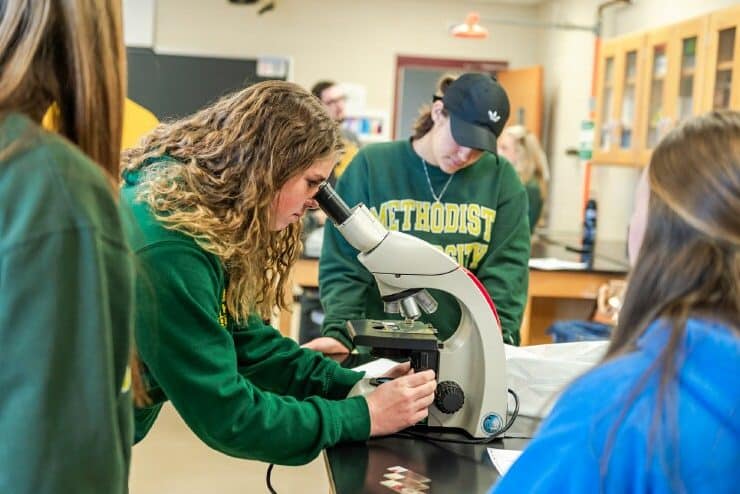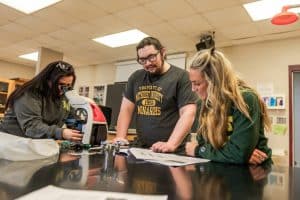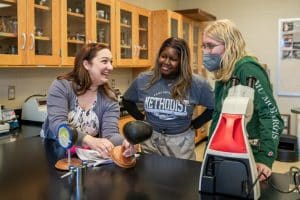
Many students who earn their bachelor’s degree in Biology end up attending one of Methodist University’s premier health science graduate programs – Physician Assistant Studies, Occupational Therapy, and Physical Therapy – a Biology degree can also lead to a mix of other successful careers, some of which are not often thought about.
Methodist University sophomore Rebekah Haigler is a go-getter as evidenced by her dedication as a treasurer of the Student Government Association and student-athlete for the MU softball team.
But the Cameron, South Carolina native particularly shines in the classroom, as the University’s Biology program has allowed her to grow both academically and personally.
“The Biology program has been incredible at creating a stimulating academic environment for me,” said Haigler, who is expected to graduate with a bachelor’s degree in Biology in 2025. “Although the program is challenging, the Biology professors are very knowledgeable, personal and work to drive student success. I look forward to learning as much as I can over the next couple of years.”
Haigler, who is an early assurance candidate for MU’s Physician Assistant Studies program, even received an opportunity to broaden her skills by presenting her own scientific research during a conference in December 2022.
“I’ve always wondered ‘Can everyone see the same colors?’,” she said. “I started studying tetrachromacy and with the help of [Associate Chemistry Professor] Dr. Vijay Antharam, I was able to test it out. I found out everyone has a completely different baseline for seeing colors. It was really neat to have an opportunity to work on something independently.”
MU Biology Prepares Students for Quality Careers

Haigler’s experience is one of the many reasons why Methodist University’s hands-on Biology program is providing students with the knowledge needed to excel in a vast number of careers.
By offering four different on-campus concentrations, the program allows students to focus on areas they are specifically interested in:
- Health Care Biology: Focusing on human biology, this concentration is ideal for students looking to become a physician assistant, pharmacist, physical therapist, occupational therapist or any other health-related position.
- Cell & Molecular Biology: Emphasizing cellular and molecular processes, pathways and structure of living organisms, this is a popular option for students interested in medical or veterinarian graduate school.
- Integrative Biology: Highlighting the relationships of organisms with each other and the environment, this concentration is a natural fit for those looking at careers related to the environment, ecology or evolution.
- General Biology: This concentration provides an all-encompassing study of biology that is ideal for students unsure of which path they want to take.
While many students who earn their bachelor’s degree in Biology end up attending one of Methodist University’s premier health science graduate programs – Physician Assistant Studies, Occupational Therapy, and Physical Therapy – a Biology degree can also lead to a mix of other successful careers, some of which are not often thought about.
“Many of our students also go onto earn their master’s or doctoral degrees in a field related to Biology,” said Dr. Stephanie Hooper Marosek, the head of the Natural Sciences Division at MU. “But we’ve had graduates work in genetics, medical toxicology and more. There are also other possible careers as a biotech company researcher, veterinarian, zoologist, marine biologist, park ranger, botanist, etc.”
Faculty, Facilities Are Shining Stars for MU Biology
Students can learn from six full-time faculty with expertise in all areas of biology including microbiology, biostatistics, anatomy, conservation, biochemistry, ecology and much more. Not only do the faculty carry a great deal of knowledge with them, but they are continually working on ways to connect with students.

“Our faculty are very involved with the students and get to know them academically and personally. They work with our students by teaching them new concepts, getting them connected to relevant materials, and get them thinking about biology outside of the classroom and lab,” Hooper Marosek said.
Some of the more unique classes offered through the Biology program include
- Embryology & Developmental Genetics: allows students to test the menstrual cycles of rats
- Medical Microbiology: utilizes a “flipped classroom” approach that prioritizes hands-on learning of immunology, virology and more
- Biological Statistics: introduces processing software for lab data, especially data related to biology analysis
Biology students have access to at least eight different labs specifically designed for microbiology, botany, anatomy and physiology, zoology, general biology and others. The program also provides students with a freezer capable of preserving important samples to temperatures as low as negative 80 degrees, professional microscopes and lab equipment, and even a real human skull.
“Methodist University offers a lot of opportunities during your time in school and afterwards,” Haigler said. “You get a taste of a lot of different teaching style, which allows you to find out how you learn best. The program can be difficult at times, but it is so rewarding.”
Methodist University is taking applications for students interested in the Biology program. Apply now or learn more about the programs on our website.